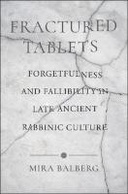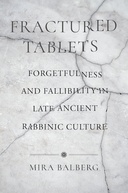Explore

This book examines the significant role that memory failures play in early rabbinic literature. The rabbis who shaped Judaism in late antiquity envisioned the commitment to the Torah and its commandments as governing every aspect of a person’s life. Their vision of a Jewish subject who must keep constant mental track of multiple obligations and teachings led them to be preoccupied with forgetting: forgetting tasks, forgetting facts, forgetting texts, and—most broadly—forgetting the Torah altogether. In Fractured Tablets, Mira Balberg examines the ways in which the early rabbis approached and delineated the possibility of forgetfulness in practice and study and the solutions and responses they conjured for forgetfulness, along with the ways in which they used human fallibility to bolster their vision of Jewish observance and their own roles as religious experts. In the process, Balberg shows that the rabbis’ intense preoccupation with the prospect of forgetfulness was a meaningful ideological choice, with profound implications for our understanding of Judaism in late antiquity.
“Lucidly written, lively, and fun to read, Fractured Tablets offers a new window into the tannaitic mind and the priorities at the foundation of the rabbinic movement from its inception.” — NATALIE B. DOHRMANN, coeditor of Jews, Christians, and the Roman Empire: The Poetics of Power in Late Antiquity
This book is included in DOAB.
Why read this book? Have your say.
You must be logged in to comment.

